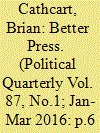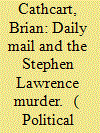| Srl | Item |
| 1 |
ID:
144825


|
|
|
|
|
| Summary/Abstract |
Writing recently in The Political Quarterly, the journalist John Lloyd took issue with regulatory remedies for ‘bad journalism’ in the United Kingdom that were proposed by the Leveson inquiry of 2011–12 and endorsed by Parliament in 2013 in the form of a Royal Charter. State action will fail, he asserted, because only journalists can change journalism, and he urged British journalists to undertake this transformation. This response argues that Lloyd dismisses the Leveson process too lightly and takes too little account of the many victims of press abuses, who are entitled to better protection. A decent society had to do something about this, and the Leveson Charter process was a measured and constructive response that offers the best hope of higher press standards and of protection for ordinary citizens while safeguarding freedom of expression for journalists. Lloyd's proposal for action by journalists, by contrast, is impractical, not least because it ignores powerful forces preventing journalists from taking control.
|
|
|
|
|
|
|
|
|
|
|
|
|
|
|
|
| 2 |
ID:
156782


|
|
|
|
|
| Summary/Abstract |
The Daily Mail's coverage of the 1993 race murder of Stephen Lawrence has been held up as an example of newspaper journalism at its best. It is a cause of pride to the paper, which has asserted that its 1997 front page accusing five men of the murder, and the comment and reporting that followed, brought about significant social and policy changes and helped achieve justice. The coverage has also been cited by the paper to rebut critics who accuse it of intolerance. Examined in detail here and set in their context, the paper's claims about its role in the case prove to be either exaggerated or not supported by evidence. The Mail's engagement in the Lawrence case involved a famous instance of editorial brilliance, but insofar as its campaign brought about or contributed to changes, they were not usually changes sought by the paper and they were sometimes contrary to its aims.
|
|
|
|
|
|
|
|
|
|
|
|
|
|
|
|